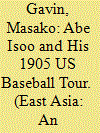| Srl | Item |
| 1 |
ID:
180008


|
|
|
|
|
| Summary/Abstract |
On 4 April 1905, during the Russo-Japanese War, Abe Isoo (1865–1949), the father of baseball in Japan, Christian intellectual, and professor of economics and political science at Waseda University, took his baseball players to the USA to play against American students and local players in California. Amidst the war and growing anti-Japanese sentiment in California, Abe realized his decade-long dream of participating in international athletic competitions in anticipation of such games contributing to the resolution of international conflicts without weapons. His two primary goals were that his students would experience “systematic scientific” baseball on its home soil and that they would broaden their international perspective. The tour marked the first school excursion sent from Japan for an overseas sporting event and also initiated Japan into the arena of international sporting competitions. This paper focuses on Abe’s view of physical education as seen in his 1905 US tour (4 April–29 June 1905).
|
|
|
|
|
|
|
|
|
|
|
|
|
|
|
|
| 2 |
ID:
064433


|
|
|
| 3 |
ID:
147371


|
|
|
|
|
| Summary/Abstract |
This paper studies the life and thought of Kawakami Kiyoshi (1873–1949), a Meiji Christian socialist and prominent journalist in late 1890s Japan for the popular newspaper Yorozu chōhō (Complete morning report). Kawakami was one of the six founding members of Japan’s first but short-lived Social Democratic Party (Shakai minshutō, 1901). After the party was forced to dissolve under the Public Peace Police Law (Chian keisatsuhō, 1900) on 16 July 1901, Kawakami left for the USA to take up a postgraduate scholarship at the University of Iowa. While in the USA, he continued his career in the press, establishing himself as a well-respected international journalist. This paper focuses on his earlier thoughts, those developed during his “pilgrimage” to the USA from 1901 to 1907, during which his interests shifted from a gradual social reform to the issue of nascent anti-Japanese agitation in California and the question of Japanese immigration. During this time, he became convicted of the humanitarian ideals of Christianity and the values of sympathy and tolerance found in the chivalrous moral tradition. This journalistic period is under-explored in the literature and yet is essential in understanding Kawakami’s later role in US-Japan relations.
|
|
|
|
|
|
|
|
|
|
|
|
|
|
|
|
| 4 |
ID:
078587


|
|
|
|
|
| Publication |
2007.
|
| Summary/Abstract |
This article explores the views of two eminent Meiji intellectuals, Abe Isoo (1865-1949) and Kawakami Hajime (1879-1946), regarding poverty and its possible cures. Both men addressed this subject at a time which saw the rapid development of monopoly capitalism in Japan. Politically, this period was typified by the social and political oppression that followed the Public Order Police Law (1900) and the High Treason Incident (1910). The latter marked the beginning of the "winter" of the socialist movement in Japan. Abe, the father of Japanese socialism, and the younger Kawakami, a bourgeois economist and later a Marxist, were two of the more prominent intellectuals concerned with poverty. This article outlines their thoughts on poverty and its possible cures in the period between 1903 and 1916 as expressed in their most representative works on the issue, Abe's Saikin no shakai mondai (Current Social Problems), (1915) and Kawakami's Bimbô monogatari (The Tale of Poverty), (1916).
|
|
|
|
|
|
|
|
|
|
|
|
|
|
|
|